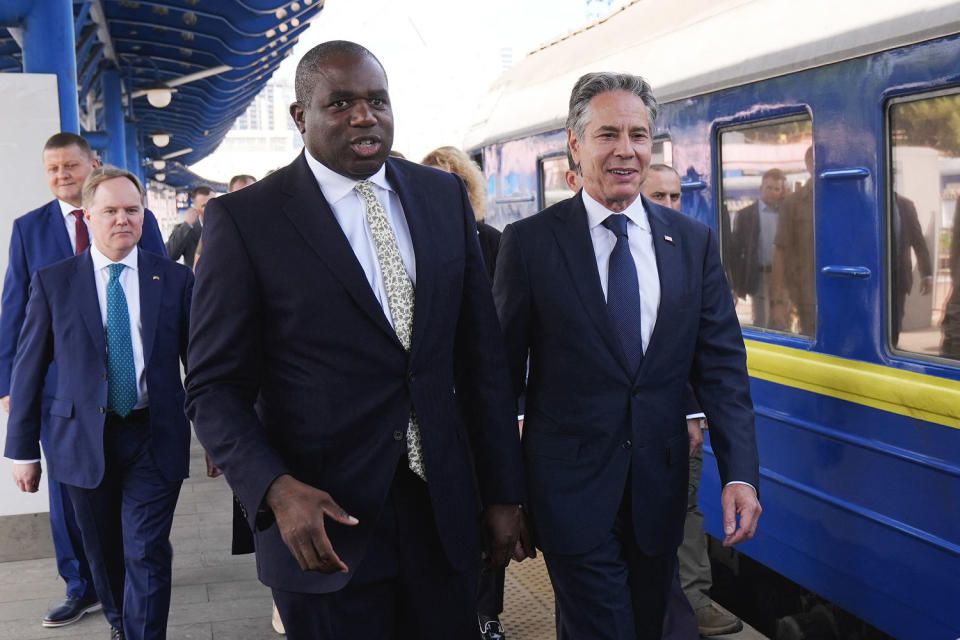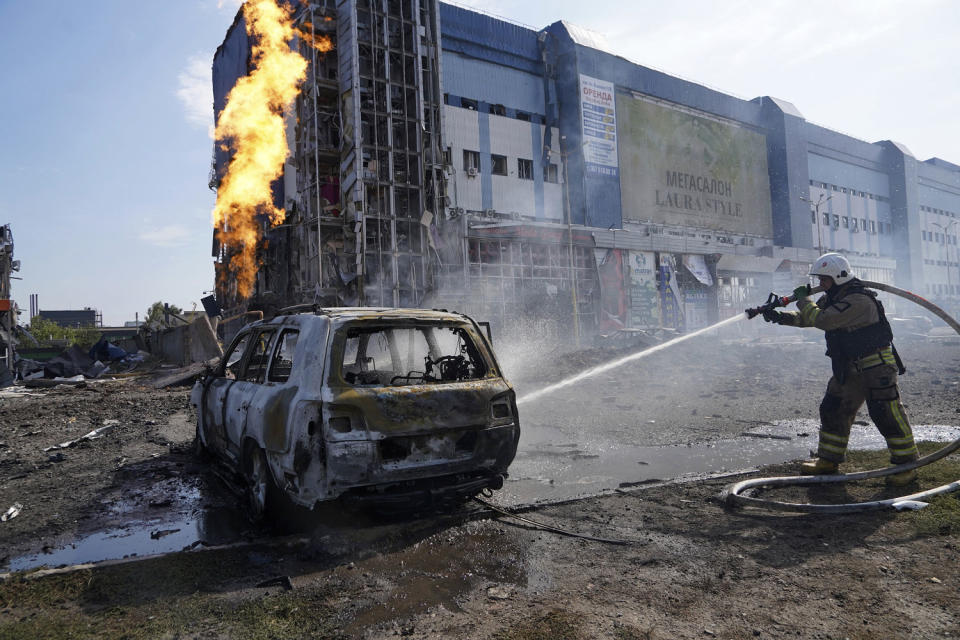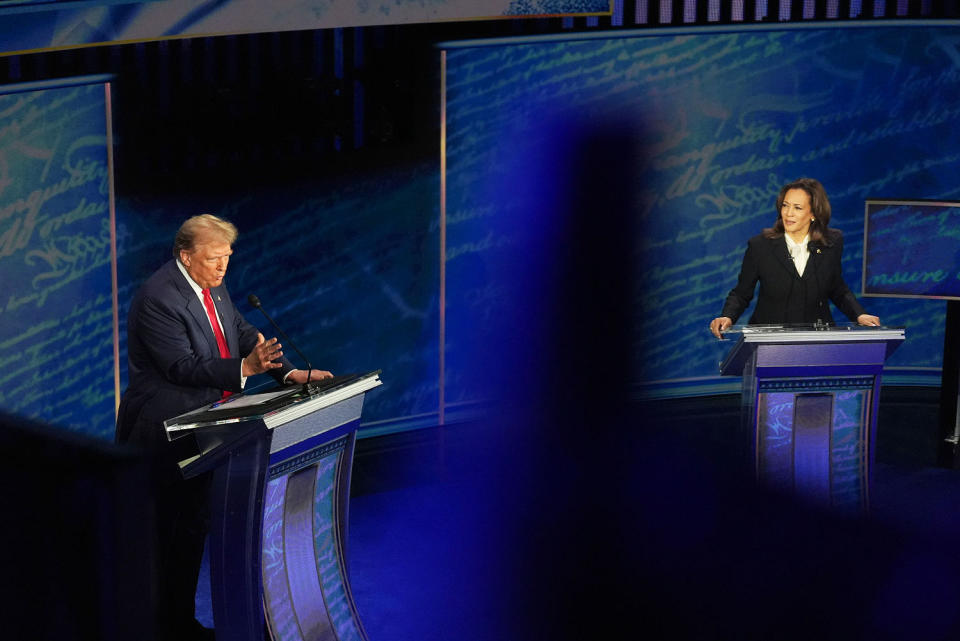KYIV, Ukraine — Ukraine woke Wednesday to a glaring display of the potentially expanding range — and possible limits — of American support.
Hours after former President Donald Trump refused to say whether he wanted the U.S. ally to win the war against Russia, Kyiv welcomed Washington’s top diplomat — hoping he will bring a long-awaited shift on its use of long-range weapons.
Secretary of State Antony Blinken’s visit offered a show of support at a critical moment in the conflict while the timing offered contrast with Trump’s comments, perhaps the most notable foreign-policy moment of his presidential debate with Vice President Kamala Harris.
But in Ukraine, many eyes were focused on the arrival of Blinken and whether it would herald news that the U.S. will allow its ally’s military to use Western-supplied long-range weapons to strike deeper inside Russian territory.

Kyiv has been pressing for a change in policy, frustrated that Western restrictions have left its hands tied as it fights to hold onto territory on two fronts: The 500 square miles seized in its daring incursion into Russia’s Kursk border region, and the strategic towns on the eastern front lines in the sights of Moscow’s military.
President Joe Biden hinted Tuesday that Kyiv might be about to get what it wants after months of resistance from the White House.
“We’re working that out right now,” Biden told reporters when asked if the U.S. would lift restrictions on Ukraine’s use of long-range weapons.
U.S. support for Ukraine was given voice on the debate stage Tuesday night by Harris, who told Trump that Russian President Vladimir Putin “would eat you for lunch” and that if Trump was in the White House when Moscow’s troops invaded in Feb. 2022, “Putin would be sitting in Kyiv right now.”
But the clash also offered signs of just how fragile that backing might be.
Trump was asked twice whether or not he wants Ukraine to win the war, but on both occasions he skirted the question. “I want the war to stop,” he said, adding that he would negotiate a deal with Moscow and that he wants “to save lives.”
Trump has previously said he would end the war within 24 hours of becoming president, without providing details.
His response may heighten concerns in Kyiv that a Trump administration would remove U.S. support and seek an end to the war on terms favorable to Russia.
Svitlana Guseva, a financial analyst in Kyiv, watched the debate and told NBC News that she found Trump’s comments “triggering.”
“I understand that there won’t be aid,” Guseva, 53, said in a telephone interview, talking about a scenario in which Trump returns to the White House. “But I want to say that Kamala Harris also doesn’t have a clear position on peace. Yes, her party will continue supporting Ukraine, but I did not hear anything about peace, and how she would attain peace.”
She said Blinken’s visit Wednesday gave her hope for “a step forward” on long-range strikes. The issue is of utmost importance to Ukraine, Guseva said, because Kyiv has to be able to adequately respond to Russia’s own strikes deep inside her country so that “some sort of compromise” can be reached in the future.


‘Boxing on the Titanic’
While Kyiv may be anxiously awaiting the outcome of November’s election, the Kremlin has played down the difference between the two candidates.
In a tongue-in-cheek comment last week, Putin claimed that he supported Harris in part because of her “infectious” laugh.
It was widely seen as his latest mischievous intervention, given Trump’s history of praise for the Russian leader and the mounting indications that he would not maintain U.S. support for Ukraine’s war effort.
And foreign ministry spokeswoman Maria Zakharova said Wednesday that she did not understand why the debate was a big deal at all, comparing it to a boxing match on board the Titanic.
“Who do you think won? Does this make any difference?” Zakharova told Russian news agency Radio Sputnik. “There are 15 minutes left until the iceberg.”


Kremlin spokesman Dmitry Peskov said later Wednesday that it was clear the U.S. “maintains a negative attitude, an unfriendly attitude toward our country” no matter the party politics.
The Kremlin was not following the debate live, he said, but paid attention to the fact that both candidates mentioned Russia and Putin. “Putin’s last name is being used as one of the tools in internal political struggle in the U.S.,” Peskov added. “We really, really don’t like it. We hope that they will leave our president’s name alone.”
Asked what Russia’s reaction would be to the U.S. lifting its restrictions on Ukraine’s use of long-range weapons, Peskov told reporters that such a decision had likely already been taken and that Moscow would respond “appropriately,” although he said the “special military operation,” as the Kremlin calls its war in Ukraine, is a response “to all these actions.”
Moscow has warned on many occasions about the consequences of such a decision.
“Russia will protest an extension of U.S. permissions. It will threaten, it will bluster, but this will not, on past evidence, translate into much in the way of concrete retaliation,” said Christopher Tuck, an expert in conflict and security at King’s College London.
“Militarily, however, an extension of permissions is likely to create only a temporary advantage to Ukraine because, also on past evidence, Russia will adapt to meet the new threat,” Tuck added.
Daryna Mayer reported from Kyiv, and Yuliya Talmazan from London.
This article was originally published on NBCNews.com


